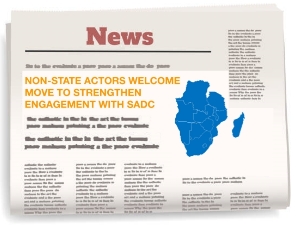NON-STATE ACTORS WELCOME MOVE TO STRENGTHEN ENGAGEMENT WITH SADC
(14 September 2023) — Non-State Actors in southern Africa have welcomed plans by the Southern African Development Community (SADC) to develop a robust engagement mechanism aimed at enhancing coordination and harmonization of efforts to drive the regional integration agenda.
Currently, engagement between Non-State Actors (NSAs) and the SADC Secretariat is based on various Memorandum of Understanding (MoU) signed with different sections of NSAs. For example, engagement with some sections of civil society is provided for in an MoU signed in December 2003 with the SADC Council of NGOs (SADC-CNGO). On the other hand, engagement with the private sector is through several other MOUs with regional business organizations such as the Association of SADC Chambers of Commerce and Industry (ASCCI) and the Southern African Confederation of Agricultural Unions.
An official from the SADC Secretariat, Wazha Omphile said the current arrangement had gaps as there are no rules of procedure for NSA’s participation in the regional policymaking processes. “Engagement is also ad hoc with a clear lack of formalized mechanism that provides for NSAs engagement with the SADC structures and process,” Omphile said at the 3rd Regional Dialogue for NSAs on the SADC Regional Indicative Strategic Development Plan (RISDP) 2020-2030.
“In this regard, SADC is now working on a process of formalizing its engagement with NSAs,” he said, adding that the formalization will include the development of the Guidelines for Accrediting NSAs, establishment of an NSA Liaison Office at the Secretariat, development of an NSA database and information sharing platform, as well as the establishment of an NSA Forum.
Participants at the dialogue, which is being held on 13-14 September 2023 in a hybrid format across six countries namely Malawi, Mozambique, Tanzania, Zambia, Zimbabwe and South Africa, welcomed the development. “This is indeed good news to us. With this new arrangement NSAs will now be able to engage directly with the Secretariat,” Justice Zvaita from the Southern Africa Climate Change Coalition said.
Zvaita said a robust engagement mechanism will ensure that the region achieves its goal of the “SADC We Want.” Facilitator for the Dialogue, Daniel Chiwandamira, who is an expert in the NSA sector concurred saying NSAs should “grab the opportunity” to strengthen their collaboration with the SADC Secretariat and contribute towards integration in southern Africa.
Irene Ngao from the Eastern and Southern Africa Small-scale Farmers Forum (ESAFF) also urged the SADC Secretariat to engage all stakeholders and ensure that their views are captured in the engagement mechanism. Beatrice Makwenda from TrustAfrica shared the same sentiments saying, “noting the October 2023 deadline, can there be a commitment to have SADC National Committees (SNC) engage at the national level for timely submission of the inputs.”
This is in light of a directive by the SADC Secretariat that urged member states to submit comments on the Accreditation Guidelines for NSAs by 31 October 2023. The 3rd Regional Dialogue for NSAs on the RISDP 2020-2030 also agreed to ensure that NSAs speak with one voice when engaging with the SADC Secretariat and member states. Unity among the NSAs will promote credibility, allowing them to make a positive impact on regional integration. It was also noted that there is a need for NSAs to collaborate in resource mobilization considering the global financial crisis.
The 3rd Regional RISDP NSA Dialogue, which is running under the theme “Accelerating SADC’s Development through the Socially Accountable Generation and Use of Public Resources,” aims to assess progress made by SADC in implementing the 10-year regional strategic plan. The SADC RISDP 2020-2030 is a regional roadmap that prioritizes the integration issues of infrastructure development, industrial development and market integration, social and human capital development and other crosscutting issues, including environment, climate change, disaster risk management, gender and youth empowerment.
The dialogue is co-convened by 14 regional organizations, led by the Partnership for Social Accountability (PSA) Alliance (a consortium of ActionAid International (AAI), Public Service Accountability Monitor (PSAM) of Rhodes University, Eastern and the Southern Africa Small Scale Farmers’ Forum (ESAFF) as well as SAfAIDS.
Other co-conveners are the Southern Africa Trust, Economic Justice Network (EJN) of the Fellowship of Christian Councils in Southern Africa (FOCCISA), Southern African People’s Solidarity Network (SAPSN), and the Southern Africa Coordination Council (SATUCC), SADC Council of NGOs, Care International, Global Campaign for Education, Trust Africa, SADC Youth Forum (SAYoF), and Agenda 2063 Media Network.























